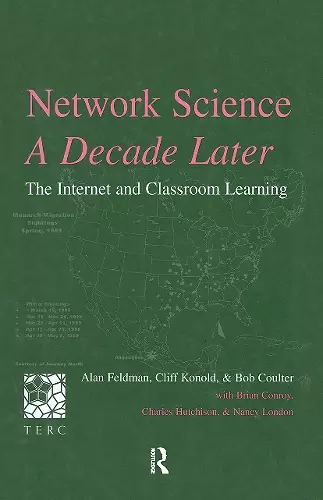Network Science, A Decade Later
The Internet and Classroom Learning
Bob Coulter author Alan Feldman author Cliff Konold author Brian Conroy author
Format:Hardback
Publisher:Taylor & Francis Inc
Published:1st Dec '99
Currently unavailable, our supplier has not provided us a restock date
This hardback is available in another edition too:
- Paperback£35.99(9780805834260)

Network Science, A Decade Later--the result of NSF-funded research that looked at the experiences of a set of science projects which use the Internet--offers an understanding of how the Internet can be used effectively by science teachers and students to support inquiry-based teaching and learning. The book emphasizes theoretical and critical perspectives and is intended to raise questions about the goals of education and the ways that technology helps reach those goals and ways that it cannot. The theoretical perspective of inquiry-based teaching and learning in which the book is grounded is consistent with the current discipline-based curriculum standards and frameworks.
The chapters in Part I, "State of the Art," describe the history and current practice of network science. Those in Part II, "Looking Deeply," extend the inquiry into network science by examining discourse and data in depth, using both empirical data and theoretical perspectives.
In Part III, "Looking Forward," the authors step back from the issues of network science to take a broader view, focusing on the question: How should the Internet be used--and not used--to support student learning? The book concludes with a reminder that technology will not replace teachers. Rather, the power of new technologies to give students both an overwhelming access to resources--experts, peers, teachers, texts, images, and data--and the opportunity to pursue questions of their own design, increases the need for highly skilled teachers and forward-looking administrators. This is a book for them, and for all educators, policymakers, students involved in science and technology education.
For more information about the authors, an archived discussions space, a few chapters that can be downloaded as PDF files, and ordering information, visit teaparty.terc.edu/book/
"The book's strength is its emphasis on enduring issues, unchanged in 40 years of reform: the need to increase teacher content knowledge and foster inquiry, the time required to study subjects in depth, and the inevitable tension between the desire for subject coverage and time required for in-depth student research."
—CHOICE
"Network science is important because it extends the discourse of teaching with and about technology beyond conventional, instrumental notions of 'technology as tool' towards technologies as social and cultural practices."
—Resource Reviews
"...an important book with interesting content and ideas for everyone who wonders how the Internet can enhance education in our nation's schools. It is of particular interest to those concerned about science learning in elementary and secondary classrooms. The authors provide an excellent history of the origins of these application of the Internet in science education....they have succeeded in presenting a valuable and stimulating treatise on important aspects of this emerging field."
—Contemporary Psychology
"The authors reach far beyond presentation of raw research data by offering a thoughtful analysis of the benefits and pitfalls of using telecommunication technology in classrooms, and providing examples of successful programs, useful teaching tips, and workable solutions to help in implementing science programs that integrate Internet technology."
—Horizon Research
"Why are network science programs so slow to take hold? When they do get started, why are so few teachers taking advantage of the opportunity to have their students collaborate with distant classrooms? [The contributors to this volume] address these questions based on over a decade of experience with a succession of network-based science programs."
—Barbara Means
Menlo Park, California; From the Foreword
"Network science departs from typcial science instruction, requiring changes in both inquiry practices and techonology use. The authors provide a rich, varied, and compelling set of case studies...They supplement these cases with examples from projects represented at the Network Science Conference they organized in 1997 and from results of a survey conducted at about the same time. They document the struggles teachers face when using a new technology to engage their students in a new practice.
"Raises critical issues regarding the goals and use of technology in science teaching and learning, and, specifically, regarding the development and implementation of what the authors call 'network science projects.' [This book] is written, as the authors claim, 'against the current political backdrop in which educational technology has emerged as education's magic bullet.' It is a book that makes us think about what educational technology is meant for and how to actually make this happen in our classrooms. It puts students' engagement, meaning making, and motivation at the foreground, and it highlights the teacher's challenging role in enabling, supporting, and facilitating student learning. It is thoughtful and thought-provoking, a must read for curriculum developers, teachers, policymakers, and educators concerned with technology in the service of science education."
—Maria Varelas
University of Illinois at Chicago
ISBN: 9780805834253
Dimensions: unknown
Weight: 476g
216 pages